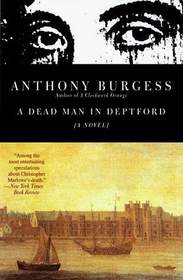Meticulously researched and fulfilling Burgess's quest to write a novel on Christopher Marlowe (upon whom he had written his university thesis while the Luftwaffe created a new meaning to Dr. Faustus's visions of hell), this novel offers a compelling, intriguing and intricate examination into the enigma that is Kit Marlowe.
It is almost cliche in reviews of historical fiction novels to say the author brought the sights and sounds of their time period to life but Burgess is able to take the reader on an absorbing sensory tour of Elizabethan London that tends to stick to your skin even after putting the book down. He presents Marlowe in the same manner, crafting all the many facets of his character; sympathetic, critical, flawed, fun-loving carouser. For those of us fascinated with Marlowe; whether it is the mystery of his murder, his being in Shakespeare's shadow or the works that he never got to create; whatever your reason, this book should be on your must read list. Admittedly novels on Marlowe are few and far between, especially in comparison to those on Shakespeare (including Burgess's own novel "Nothing Like the Sun" which is not as good as this but a good companion to this book), but this one stands above and has become my measuring stick. The reviewer from the Scotsman (Edinburgh) stated it most aptly - "His Kit Marlowe is a wonder to behold."
Burgess's use of Elizabethan/Early Modern English and dialogue heavy style may put off and/or confuse some readers. He does not use quotations, instead he uses indentations and dashes with rare references to the speaker. This can be a bit disconcerting at first but once you get into the flow and rhythm it only adds to your immersion in Marlowe's world.
It is almost cliche in reviews of historical fiction novels to say the author brought the sights and sounds of their time period to life but Burgess is able to take the reader on an absorbing sensory tour of Elizabethan London that tends to stick to your skin even after putting the book down. He presents Marlowe in the same manner, crafting all the many facets of his character; sympathetic, critical, flawed, fun-loving carouser. For those of us fascinated with Marlowe; whether it is the mystery of his murder, his being in Shakespeare's shadow or the works that he never got to create; whatever your reason, this book should be on your must read list. Admittedly novels on Marlowe are few and far between, especially in comparison to those on Shakespeare (including Burgess's own novel "Nothing Like the Sun" which is not as good as this but a good companion to this book), but this one stands above and has become my measuring stick. The reviewer from the Scotsman (Edinburgh) stated it most aptly - "His Kit Marlowe is a wonder to behold."
Burgess's use of Elizabethan/Early Modern English and dialogue heavy style may put off and/or confuse some readers. He does not use quotations, instead he uses indentations and dashes with rare references to the speaker. This can be a bit disconcerting at first but once you get into the flow and rhythm it only adds to your immersion in Marlowe's world.




